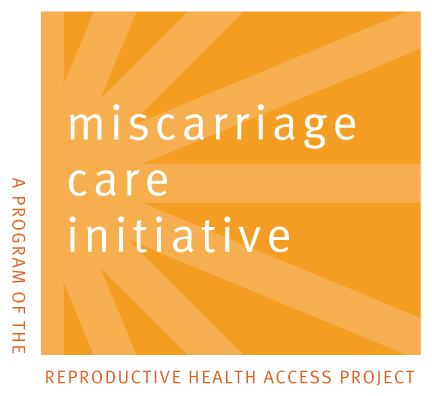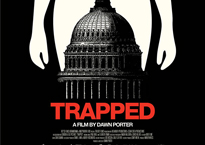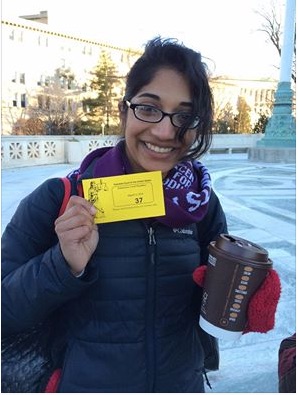Mar 20

You can Support Project Access today!
Newsletter/April 2016
A supporter of the Reproductive Health Access Project (RHAP) has agreed to match all contributions made in April and May up to $10,000 dollar-for-dollar! Take advantage of this exciting chance to double your gift!
Since one in five pregnancies ends in miscarriage and one in three women will have an abortion in her lifetime, training in comprehensive reproductive health care is essential. But in the United States today, most primary care training programs don’t provide abortion training, and most don’t offer thorough training in contraception and miscarriage care.
With increasing attacks on abortion care nationwide, bringing reproductive health care into mainstream medicine and developing strong advocates is a powerful way to show that abortion is basic health care and that all people deserve to receive the full spectrum of reproductive care from their primary care providers. With your support, we can continue our valuable work of expanding access to safe, scientifically sound, and readily accessible reproductive health care.
The Reproductive Health Access Project has set a goal of raising $10,000 this April and May. If we reach our goal it will be matched for a total of $20,000 raised! Help us reach our goal and make your 100% tax-deductible donation to the Reproductive Health Access Project today!
 This election season will have a big impact on the future of reproductive health care. State, local, and national legislators have the power to enact reproductive health policies that affect our lives. The Reproductive Health Access Project is all about making informed decisions, and we want to make sure you have the information you need to make your decision this election season.
This election season will have a big impact on the future of reproductive health care. State, local, and national legislators have the power to enact reproductive health policies that affect our lives. The Reproductive Health Access Project is all about making informed decisions, and we want to make sure you have the information you need to make your decision this election season.
RHAP compiled a list of resources on our Vote 2016: Get the Facts website to help you understand where national and local candidates stand on the reproductive health issues important to you. There are also resources about important allied actions from All* Above All, Act for Women, and Coalition for Liberty and Justice. Our state-by-state resources have details on upcoming primaries and voter registration. We are working to keep the information as up-to-date as possible and will be updating our state-by-state resources with voter guides as they are published. There will be more information on senate and house candidates as well as ballot measures for each state as the information becomes available.
In preparation for the launch of our Vote 2016: Get the Facts website we consider, “What would the 2016 presidential candidates be like in the exam room?” Check out this video from our hilarious friends, Buzz Off, Lucille:
Visit Vote 2016: Get the Facts to find out where presidential, house, and senate candidates stand on reproductive health issues. Learn about state ballot initiatives that could affect your access to reproductive health care. And, don’t forget to register to vote!
 The Miscarriage Care Initiative (MCI) is an effort by the Reproductive Health Access Project to expand access to evidence-based, patient-centered miscarriage care in primary care settings. Our vision is to support family physicians and clinic administrators to integrate all three forms of miscarriage management—expectant, medication, and manual vacuum aspiration (MVA) management—into their clinical practice.
The Miscarriage Care Initiative (MCI) is an effort by the Reproductive Health Access Project to expand access to evidence-based, patient-centered miscarriage care in primary care settings. Our vision is to support family physicians and clinic administrators to integrate all three forms of miscarriage management—expectant, medication, and manual vacuum aspiration (MVA) management—into their clinical practice.
Read about our 2015-2016 MCI grantees here!
Over the grant period, five organizations will work closely with RHAP to integrate and expand miscarriage treatment into a primary care practice site. Each applicant organization will identify a “Clinical Champion,” who will be the primary point of contact and lead program implementation at the practice site. Grantees become part of a learning collaborative and receive intensive support that includes refresher training for the Clinical Champion, start-up supplies and equipment, patient education materials, and technical assistance to address administrative and operational needs. The grant period typically ranges from 12-18 months.
To apply, the site must be a primary care setting. RHAP will strive to select a diverse cohort of grantees, both in terms of practice setting (community health centers, private practices, academic practices, etc.) and geographic location (regionally and urban vs. rural). Priority will be given to clinics working with medically underserved populations, are federally qualified health centers, and/or have a family medicine residency program. The Clinical Champion should be a board-certified or board-eligible family physician in the United States.
Please visit our website for a full description of the Miscarriage Care Initiative and to access the application. Please email the MCI Manager, Laura Riker, at laura@reproductiveaccess.org if you have any questions. We are accepting applications through June 17, 2016. Submissions will be reviewed on a rolling basis so we encourage you to apply early!
 Last week, the Reproductive Health Access Project co-hosted a screening of Dawn Porter’s award-winning documentary, Trapped. We teamed up with the NYU Law Students for Reproductive Justice, the National Institute for Reproductive Health, and the Sea Change Program. The result was a fantastic and thought-provoking evening.
Last week, the Reproductive Health Access Project co-hosted a screening of Dawn Porter’s award-winning documentary, Trapped. We teamed up with the NYU Law Students for Reproductive Justice, the National Institute for Reproductive Health, and the Sea Change Program. The result was a fantastic and thought-provoking evening.
Trapped follows clinic workers and lawyers on the front lines of the battle to keep abortion safe and legal for millions of Americans. With 288 laws regulating abortion providers passed by state legislatures in the past four years in 44 states and the District of Columbia, this film begs the question: what remains of a woman’s right to choose?
A lively Q&A with our panel of experts followed the film. Speakers included the Reproductive Health Access Project Medical Director, Linda Prine, MD , The Sea Change Program Managing Director, Steph Herold, MPH, the National Institute for Reproductive Health Manager of Local Initiatives, Jenny Dodson Mistry, MPH, the Institute for Family Health Attending Physician, Sarah Miller, MD, and was moderated by Kelly Baden, Director of State Advocacy from the Center for Reproductive Rights. The discussion covered a wide range of topics including what it is like for providers to fly in to low-access areas to provide abortion care, what kind of impact the new label for mifepristone might have on increasing access, and how to talk to your children about your own abortion story to help reduce abortion stigma.
We are so pleased that we were able to share Trapped with our supporters in the NYC area. The film was so inspiring and a must-see for anyone committed to reproductive justice and freedom. If you are interested in finding a community screening in your area CLICK HERE, or, you can CLICK HERE to host a screening of your own!
It was an amazing experience to team up with such wonderful allies to host this event and we were so happy to have the positive energy of so many pro-choice advocates in the room. Thank you to NYU Law Students for Reproductive Justice, the National Institute for Reproductive Health, and The Sea Change Program for helping make the evening a success. And thank you to all our wonderful supporters for joining us!
The National Day for the Appreciation of Abortion Providers is observed every year on March 10 to commemorate the death of David Gunn, MD, who was murdered by an anti-choice extremist in 1993. On this day, we celebrate the life and work of all the abortion providers who work tirelessly to ensure that everyone has access to safe, affordable, and compassionate abortion care.
In March, we asked our community to tell us why they appreciate abortion providers. Here’s what you told us:
Why do you appreciate abortion providers?
“Their brave work allows women and girls to make their own decisions and live their own lives.”
“They stand with women during some of the most challenging times of their lives.”
“I appreciate abortion providers for recognizing that abortion is a normal part of health care, and for taking care of their patients with compassion and dedication despite facing threats and stigma for the essential work that they do. Thank you!”
“I was an abortion counselor before Roe v. Wade. It was a scary time, but maybe not as scary as it is for you now. Back then we could go to jail for giving information, now you know you are risking your life to save lives. Because what you do is save women’s lives who otherwise might be forced to try to do it themselves or go to a non-doctor for help. So I respect and honor what you do. Thank you.”
“The providers I know are the most compassionate people I have ever met. They offer patients support, dignity, and care. Even in the face of stigma, threats, and violence, abortion providers come to work each and every day ready to help others. It’s beyond inspiring and I can never thank them enough!”
“You do important, necessary work to protect the health and well-being of women. Abortion care is just as vital as maternity and family planning care for women to have control over their bodies and lives.”
“I appreciate their commitment, bravery, dedication, and service orientation. Many travel long distances to allow women access to desperately needed services.”
“They provide compassionate care in a moment of deep need. They face stigma and danger in order to provide a service desperately needed by women. They help women control their fertility and thus their lives.”
We want to hear your thoughts! Share your own comments about why you appreciate abortion providers here.

I arrived in Washington on Tuesday, March 2, the day before the oral arguments for Whole Woman’s Health v. Hellerstedt. I was planning to meet up with the Reproductive Health Access Project (RHAP) staff to make rally signs and then attend the rally on Wednesday morning. As we touched down in D.C., my fellow law students and I got a flurry of excited texts from a friend who was already at the Supreme Court, telling us that there were only two dozen people in line for public tickets so far – and that normally 30-50 people got in. We grabbed our suitcases, hopped on the Metro, jogged up Capital Hill, and got in line by 5pm. We estimated we might be the 30th to 35th people in line.
Spending the night on the sidewalk in front of the Supreme Court was definitely an adventure. Friends stopped by with supplies and food, and RHAP’s amazing board member Emily Kane-Lee gave us a sleeping bag, umbrellas, and hats. Over the course of the night as we hid from the rain, we shared stories of why the case was so important to us with other people in line. I got interviewed by a TV station from Houston and the website Refinery29, which was very exciting (and nerve-wracking)! Before I knew it though, the sun was coming up and security guards were letting us into the Court.
The ushers seated us in the back, center row of the courtroom. A buzzer sounded and the whole room stood as the eight Justices of the Supreme Court entered. Stephani Toti, the lawyer representing Whole Woman’s Health, stepped forward and began her argument to the Court. She spoke for barely a minute before the Justices jumped in, peppering her with questions. Chief Justice Roberts and Justice Kennedy spent several minutes focused on procedural and administrative questions. But Justice Ginsberg guided the conversation back and secured extra time for Toti to address the damaging outcomes of HB2 on Texas women. After she finished, the U.S. Solicitor General, Donald B. Verrilli, Jr., spoke on behalf of Whole Woman’s Health as well. His office had asked to join the case, which to me emphasized the larger, national impact of TRAP laws like HB2. He was an amazing advocate and effortlessly switched between answering the Justices’ questions and reiterating the key reasons why ambulatory surgical center requirements and admitting privileges for physicians were TRAP laws.
The Texas Solicitor General, Scott Keller, spoke next in defense of HB2. Once again, the Justices only gave him a few seconds before they jumped in with questions. Justices Sotomayor and Kagan focused on how HB2 was medically unnecessary because of how safe early abortion is. Justice Breyer cut to the real intent of the law, which was to reduce access to abortion. Justice Ginsberg highlighted how unreasonable it was for Texas to say it was critical to enact strict abortion regulations and then also suggesting women in West Texas could go to New Mexico for care when their clinics where forced to close, even though New Mexico has completely different requirements.
Before I knew it time had elapsed and the Court adjourned. I looked at my friends and all of us had the same dazed, thrilled look of knowing we had just witnessed history.
I joined the RHAP staff on the steps of the Supreme Court after that, catching the end of the rally. It was incredible to be in that crowd of over 2,000 people, seeing familiar faces from New York and Texas standing up for reproductive rights. Moving to Texas from New York for law school has been a huge change, and I don’t think anything could have prepared me for seeing the effects of HB2 firsthand. In January, I joined the board of the Lilith Fund for Reproductive Equity, which gives money to people in Texas who need abortions. Lilith is constantly fundraising, but even with all that they can only fund a third of the calls they receive asking for help. I also volunteer with Jane’s Due Process (JDP), a nonprofit that helps teenagers in Texas obtain abortions and navigate the legal hurdles. All of the teens I speak to on the JDP hotline are so strong and it is so difficult having to list out the legal hoops they must jump through to get what should be basic health care.
Seeing firsthand how stigmatized and segregated abortion care has become in Texas has made RHAP’s work all the more important to me. Abortion is health care and RHAP’s commitment to integrating reproductive health into primary care is a goal I am committed to working towards, now more than ever.
Subscribe to receive monthly updates from the Reproductive Health Access Project.
Your gift allows us to train and support health care providers across the United States so they can offer patients compassionate and comprehensive care.
Mar 20
